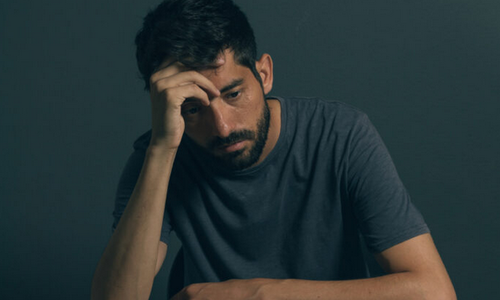
Authored by Naveen Athrappully via The Epoch Times (emphasis ours),
A recent study published by Oregon State University discovered that COVID-19 infected individuals have a higher chance of developing psychiatric disorders within about four months of contracting the virus.

For the study, published in World Psychiatry on May 7, researchers used data from the National COVID Cohort Collaborative (N3C). They matched 46,610 patients infected with COVID-19, which can trigger a respiratory tract infection (RTI), with control patients diagnosed with a different RTI.
This allowed researchers to specifically look into how COVID-19 affected the mental health of infected individuals. No patients with any history of mental illness prior to 21 days after a COVID-19 diagnosis were included in the study. Those with a medical record extending a year prior to their COVID-19 diagnosis were also excluded.
Researchers looked at the rate of psychiatric diagnoses in the 46,610 COVID-19 patients for two time periods—the early post-acute phase between 21 and 120 days from the infection and the late post-acute phase between 121 and 365 days from the infection.
The study discovered that COVID-19 patients had a 3.8 percent rate of developing a psychiatric disorder in the early post-acute phase when compared to just 3 percent for other respiratory tract infections. This amounted to a nearly 25 percent higher risk for COVID-19 patients.
However, the researchers did not find such a “significant difference in risk” when they compared COVID-19 late post‐acute phase patients with individuals with other respiratory tract infections.
When researchers looked at anxiety disorders, they found the incidence proportion of a new‐onset anxiety disorder diagnosis was “significantly higher” for COVID-19 patients when compared to RTI patients. For mood disorders, such significant differences were not observed.
“For people that have had COVID, if you’re feeling anxiety, if you’re seeing some changes in how you’re going through life from a psychiatric standpoint, it’s totally appropriate for you to seek some help,” Lauren Chan, co-author of the study, said according to a June 6 news release by Eurekalert.
“And if you’re a care provider, you need to be on the proactive side and start to screen for those psychiatric conditions and then follow up with those patients.”
Chan stressed that not every COVID-19 infected individual is going to have such psychiatric problems. In the context of the health care infrastructure of the United States, an increase in the number of COVID-19 patients seeking psychiatric care could add more strain on the system, she warned.
Multiple other studies have also suggested that a segment of COVID-19 patients might end up facing psychological issues.
Research published in April 2021 found that 34 percent of the 236,379 COVID-19 survivors included in the study developed neurological and mental disorders in the six months after becoming infected, according to WebMD.
Anxiety was the most commonly found disorder, with 17 percent of subjects reporting it. This was followed by mood disorders at 14 percent, substance abuse disorders at 7 percent, and insomnia at 5 percent.
When it came to neurological problems, 0.6 percent reported brain hemorrhage, 2.1 percent reported ischemic strokes, and 0.7 percent reported dementia. Among patients diagnosed as seriously ill with COVID-19, these rates jumped. Of the patients admitted to the intensive care unit, 7 percent experienced a stroke while 2 percent were diagnosed with dementia.
In another study published on Feb. 16 at BMJ, researchers analyzed records of nearly 153,848 COVID-19 patients in the Veterans Health Administration (VHS) system, comparing them with individuals who had not contracted the virus.
Those who got infected were found to be 35 percent more likely to be diagnosed with anxiety following the infection than uninfected people, 38 percent were more likely to be diagnosed with adjustment and stress disorders, 39 percent were more likely to be diagnosed with depression, and 41 percent were more likely to be diagnosed with sleep disorders.
“There appears to be a clear excess of mental health diagnoses in the months after Covid,” Paul Harrison, a professor of psychiatry at the University of Oxford who was not involved in the study, told The New York Times.
However, only 4.4 to 5.6 percent of individuals in the study were diagnosed with anxiety, depression, adjustment, and stress disorders.
“It’s not an epidemic of anxiety and depression, fortunately,” Harrison added. “But it’s not trivial.”
Authored by Naveen Athrappully via The Epoch Times (emphasis ours),
A recent study published by Oregon State University discovered that COVID-19 infected individuals have a higher chance of developing psychiatric disorders within about four months of contracting the virus.

For the study, published in World Psychiatry on May 7, researchers used data from the National COVID Cohort Collaborative (N3C). They matched 46,610 patients infected with COVID-19, which can trigger a respiratory tract infection (RTI), with control patients diagnosed with a different RTI.
This allowed researchers to specifically look into how COVID-19 affected the mental health of infected individuals. No patients with any history of mental illness prior to 21 days after a COVID-19 diagnosis were included in the study. Those with a medical record extending a year prior to their COVID-19 diagnosis were also excluded.
Researchers looked at the rate of psychiatric diagnoses in the 46,610 COVID-19 patients for two time periods—the early post-acute phase between 21 and 120 days from the infection and the late post-acute phase between 121 and 365 days from the infection.
The study discovered that COVID-19 patients had a 3.8 percent rate of developing a psychiatric disorder in the early post-acute phase when compared to just 3 percent for other respiratory tract infections. This amounted to a nearly 25 percent higher risk for COVID-19 patients.
However, the researchers did not find such a “significant difference in risk” when they compared COVID-19 late post‐acute phase patients with individuals with other respiratory tract infections.
When researchers looked at anxiety disorders, they found the incidence proportion of a new‐onset anxiety disorder diagnosis was “significantly higher” for COVID-19 patients when compared to RTI patients. For mood disorders, such significant differences were not observed.
“For people that have had COVID, if you’re feeling anxiety, if you’re seeing some changes in how you’re going through life from a psychiatric standpoint, it’s totally appropriate for you to seek some help,” Lauren Chan, co-author of the study, said according to a June 6 news release by Eurekalert.
“And if you’re a care provider, you need to be on the proactive side and start to screen for those psychiatric conditions and then follow up with those patients.”
Chan stressed that not every COVID-19 infected individual is going to have such psychiatric problems. In the context of the health care infrastructure of the United States, an increase in the number of COVID-19 patients seeking psychiatric care could add more strain on the system, she warned.
Multiple other studies have also suggested that a segment of COVID-19 patients might end up facing psychological issues.
Research published in April 2021 found that 34 percent of the 236,379 COVID-19 survivors included in the study developed neurological and mental disorders in the six months after becoming infected, according to WebMD.
Anxiety was the most commonly found disorder, with 17 percent of subjects reporting it. This was followed by mood disorders at 14 percent, substance abuse disorders at 7 percent, and insomnia at 5 percent.
When it came to neurological problems, 0.6 percent reported brain hemorrhage, 2.1 percent reported ischemic strokes, and 0.7 percent reported dementia. Among patients diagnosed as seriously ill with COVID-19, these rates jumped. Of the patients admitted to the intensive care unit, 7 percent experienced a stroke while 2 percent were diagnosed with dementia.
In another study published on Feb. 16 at BMJ, researchers analyzed records of nearly 153,848 COVID-19 patients in the Veterans Health Administration (VHS) system, comparing them with individuals who had not contracted the virus.
Those who got infected were found to be 35 percent more likely to be diagnosed with anxiety following the infection than uninfected people, 38 percent were more likely to be diagnosed with adjustment and stress disorders, 39 percent were more likely to be diagnosed with depression, and 41 percent were more likely to be diagnosed with sleep disorders.
“There appears to be a clear excess of mental health diagnoses in the months after Covid,” Paul Harrison, a professor of psychiatry at the University of Oxford who was not involved in the study, told The New York Times.
However, only 4.4 to 5.6 percent of individuals in the study were diagnosed with anxiety, depression, adjustment, and stress disorders.
“It’s not an epidemic of anxiety and depression, fortunately,” Harrison added. “But it’s not trivial.”





